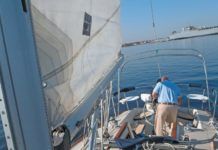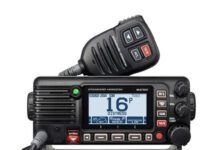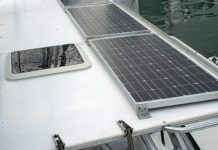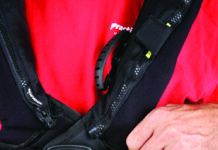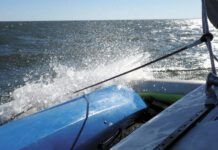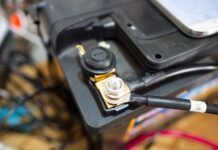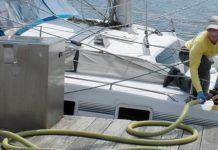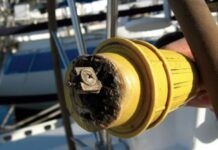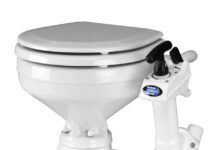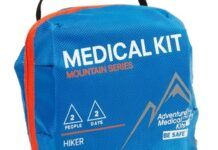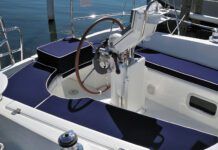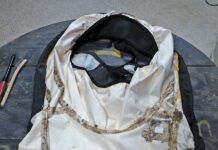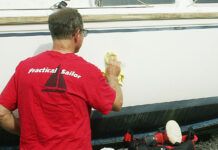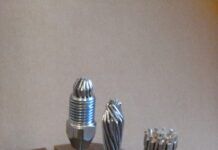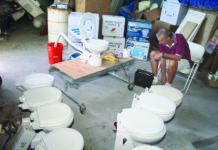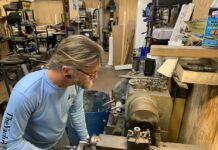At their best, all but brand-new flexible plastic “windows” are wrinkly, often scratched or cloudy, and vulnerable to dirt that further obscures vision. There are, however, a number of products on the market that are designed to preserve, clean, and even repair some of the damage. For this comparison, we tested some of the clear plastic cleaners/preservers dedicated to this task, as well as those that purport to repair minor scratching and clouding. Several brands come in two- or three-part systems.
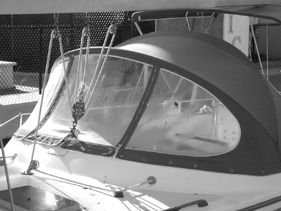
In all, we rounded up 14 products from nine manufacturers. We evaluated them based, first of all, on effectiveness, but also on ease of use and economy.
The products fell into three broad types: liquids, creams and sprays. All have their advantages and disadvantages. The liquids tend to run, which can be annoying, but leave relatively little residue. The creams aren’t as runny, but do leave more residue that’s sometimes difficult to remove. The sprays go on fine and are the easiest to clean up, but you can inhale a whiff of whatever’s being used, and the pressurized cans are vulnerable to high heat, something else to worry about on hot days.
Cleaning: A Primer
The best means of keeping up with dodger window maintenance is a simple washdown after a day on the water. This serves to remove not only dirt but also salt spray that will cut down visibility for your next trip, and can also cause scratching during storage. A freshwater wash is especially important before attempting to scrub your windows, because dirt and salt crystals can cause nicks and gouges in otherwise healthy plastic. For occasional maintenance, a hose-down followed by a washing with mild detergent or one of the specialized cleaning products will suffice.
Application is also important. Brushes, even paper towels, can scratch the surface. “The best cloth to use is an old baby diaper,” says Rich Morelle of Bainbridge International, which supplies canvas and plastic materials to many custom canvas shops and manufacturers. A soft cotton cloth should be used to dry your plastic after washing. Avoid folding dodgers when the windows are wet.
Most cleaner makers recommend applying the solution in a gentle circular motion, then removing/buffing it dry with a clean cloth. (We did hear from one cleaner maker who recommended, in the case of scratches, rubbing in the restorer perpendicular to a scratch, which would lead to some filling; but that’s a temporary fix that can lead to later problems, like attracting even more dirt or other foreign substances.)
Clear “plastic” can denote one or more very different types of materials, and some are especially sensitive to some cleaning agents. Generally, for windshields and side curtains, you will find just two kinds of plastic in the marine market—vinyl and coated vinyl. At the high end is Strataglass, a pressed, polished vinyl with a hard polycarbonate coating. Ports and hatches, on the other hand, are likely to be made of acrylics or polycarbonates, including such common brands as Lucite, Plexiglas and Acrylite.
We talked with three of the largest plastic curtain makers. Most suggested avoiding using strong cleaners or polishing products, saying simple mild soap and water is a safe way to go. All recommended staying away from the stronger and harsher cleaners and those containing petrochemicals (oils), alcohol, and silicone. Dino Urena of PolyOne, the company that makes Ultrashield, explained that oils, even silicone, can leave a film that attracts dirt.
Edwin Irvine, Strataglass president, recommends using a simple 10% solution of vinegar and water for routine cleaning. Strataglass specifically recommends Collinite’s Insulator wax after rinsing and drying/buffing the wax with a soft cloth. Other polishes, Irvine agrees, tend to leave a greasy residue. He also has one specific caution: Use of Rain-X Marine Windshield Treatment on Strataglass (or regular vinyls) can lead to deterioration of the coating. A Rain-X spokesman says it’s safe on glass and “uncoated” Plexiglas.
While it’s always helpful to listen to advice from the manufacturers, some of it must be taken with a grain of salt. Several, for example, mentioned Meguiar’s Mirror Glaze as acceptable, although it contains petroleum distillates.
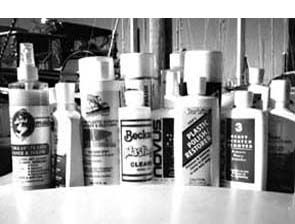
Jeff Tieghe of Star brite has some advice of his own. Among products that should not be used on clear vinyl he adds alkaline detergents, such as Joy or Tide. Good plastic cleaner/polishes, he says, contain such things as plasticizers to renew the surface and protect from harmful UV rays (some plastics come with built-in UV inhibitors). Like the manufacturers, Tighe says that prevention is the best way to maintain your plastic for years. One important step is to keep vinyl away from aluminum supports, which can discolor it irrevocably. There are nylon mounts and standoffs that can keep your plastic away from aluminum. “You can probably double its life,” he said.
Test Results
We tested the various products on a variety of surfaces taken from our own canvas and curtains, which included Stratraglass, Ultrashield, and Solvay Draka. We made several go-arounds with each product, following manufacturers’ directions precisely and using clean white cotton cloth for all application and removal. In several cases, if we weren’t satisfied with the first results, we gave a product more applications. We tried the products separately and then, where appropriate, in combination. In that case, manufacturers recommend that you begin with a restorer, and then use a cleaner. Although clear vinyl plastics were our main concern, we also tried the products on various hard plastics that are used for ports and hatch covers.
210 Plastic Cleaner Polish, 210 Plus Plastic Scratch Remover. Distributed by Armada Coatings, this two-part system consists of an aerosol cleaner and a squirt scratch remover. The cleaner had a slight citrus odor, contains petroleum distillates, and is flammable. For scratched plastic, the seller recommends using the 210 Plus first. Both products worked very well, with the scratch remover, a white liquid but not too runny, doing one of the best jobs of covering hairline scratches. Overall rating: Very good. Prices: $9.95 for both the 14-oz. aerosol and 15-oz. scratch remover.
3M Marine Clear Plastic Cleaner and Polish, 3M Marine Clear Plastic Restorer. Both cleaner and restorer are liquid pastes (the former white, the latter beige), thus are less runny than a liquid. The cleaner left more of a residue than, say, the Star brite version, but with similar cleaning results. Ditto for the restorer. Overall performance: Fair to good, but we’re not sure we’d pay the premium for the 3M. Prices: for both $11.95/8 fl. oz.
Beckson’s Plasti-care Clear Plastic Cleaner. Beckson, best known for its hatches, hand-pumps and ports, makes no bones about not being in the cleaning business. It markets its plastic cleaner as a complement to its main line. It’s a basic liquid cleaner containing petroleum distillates, doesn’t smell too bad and, despite being quite runny (a problem when working on installed canvas) does a fair job at routine maintenance cleaning. Overall rating: Fair. Price: $5.70/8 fl. oz.
Dolphinite Clear Plastic Cleaner & Polish, Scratch Remover & Restorer. Another spray, the Dolphinite cleaner, did an excellent job of removing dirt from clear vinyl and other surfaces. The restorer, an odorless white liquid paste, worked well on finer scratches and showed some improvement with even deeper cuts. Unlike some of the other products, the label states these are specifically for clear vinyl windows as well as other plastics. Overall rating: Very good. $15.95 for the 14-oz. spray or 15-fl. oz. remover and restorer.
Mer-maids Plexiglas/Plastic Cleaner & Polish: This is a silicone-based liquid spray that tends to run, but does a decent job of routine cleaning. Five years ago, our testers complained that this cleaner gave them headaches but, in fact, it contains no petroleum distillates or other nasty ingredients. The silicone, which provides an anti-static and protective coating, is contained in a water/isopropyl alcohol solution. Some plastic manufacturers don’t like silicone or alcohol, but Mer-maids has testimony from two producers, GE (Lexan) and Atofina (Plexiglas), that tests showed no harmful effects on their hard plastic products. No word on long-term effects on softer vinyl. Mer-maids does make another cleaner, Plas-Tec®, that contains no silicone. Overall rating: Fair to good. It’s also a Best Buy in its category. Price: $7.95/16 fl. oz.
Meguiar’s Mirror Glaze 18 Plastic Cleaner/Polisher; Mirror Glaze 17 Clear Plastic Cleaner; Mirror Glaze 10 Clear Plastic Polish: The all-purpose #18 has been renamed a “detailer,” according to a company spokesman, meaning it’s suited for light maintenance. That about sums up our experience. For heavier work, use of #10 and #17 in combination is recommended. Although a previous tester found the “grit” in 17 too rough for clear plastic, the product in fact contains no grit and is non-abrasive. Overall rating: Fair for #18, good for the #10 and #17 combo. Prices: $6.99/8 fl. oz. for all.
Novus Polish No. 1, Plastic Clean & Shine; Polish No. 2, Fine Scratch Remover; Polish No. 3, Heavy Scratch Remover: This three-part system is designed to handle jobs from simple cleaning to removal of deeper scratches. The caveat is that Polish No. 3, the heavy scratch remover, is too harsh for vinyl or any coated plastics. The basic cleaner is a pump-spray liquid that did its job. The fine scratch remover, a liquid paste, worked OK, but not notably better than, say, the Dolphinite. Novus 3 Heavy Scratch Remover did everything it was supposed to (we’re always somewhat surprised when this happens), removing some fairly deep scratches on a square of acrylic. Overall rating: Good to very good for the cleaner/polish, very good for the No. 3 Scratch Remover. Prices: No. 1, $6.95, No. 2, $8.50, No. 3, $9.50, all 8 fl. oz.
Plexus Plastic Cleaner Protectant & Polish: This spray worked very well, although we did catch a whiff of it during use. The spray lays down a very fine film that is easily removed without leaving noticeable residue. It can be used on virtually all materials, including acrylics and fiberglass. The manufacturer warns against using paper towels—good advice for any of the cleaners. Note that the product is flammable and should not be stored where the temperature exceeds 120° F. Overall rating: Very good. Price: $10.99/13-oz. can.
Star brite Plastic Polisher/Restorer, Plastic Scratch Remover: We liked the results we got with the cleaner, a pale yellow liquid with a pleasant aroma. We thought the off-white scratch remover, which contains a plasticizer, did only a fair job of minimizing scratches. Overall rating: Fair. Prices: $6.99/8 fl. oz., either product.
Conclusions
Just about all the cleaners did what they are intended to do—there’s no great secret, after all, about marketing a basic cleaner. We tend not to like the liquids because of their dripping—the same reason we avoid them at home—and prefer the less messy liquid pastes. But, despite the storage disadvantages of aerosol cans, we found the 210 and Plexus easiest to work with, at the same time providing superior results.
Among the paste/liquid spray combinations, we liked the Dolphinite, both cleaner and restorer, which left minimal residue and produced results close to if not equal to the aerosols.
The liquids do tend to be cheapest and certainly work well as cleaners. Here, we’d go with the Mer-maids, which was equal to the other liquids in cleaning power as well as a Best Buy.
If you have scratched ports and hatches, we can recommend the Novus 3 Heavy Scratch Remover. Just remember that it can harm some softer vinyls or coated plastics.
We found that there are no miracle products that will remove deeper scratches from clear plastic. Listen to the pros: Wash down after a wet day on the water and store properly. As with most things, prevention is most of the battle.
Contacts – Cleaners: 210 Plastic Cleaner/Polish, www.armadacoatings.com. 3M Marine, 877/366-2746; www.3m.com/US/auto_marine_aero/marine/. Beckson Plasti-Clear, www.beckson.com. Dolphinite, 978/356-9834; www.dolphinite.com. Meguiar’s, www.meguiars.com. Mer-Maid Products, 206/910-0862; www.mermaid.com. Novus, 800/548-6872; www.noscratch.com. Plexus, 800/405-6495; www.plexusplasticcleaner.com. Star brite, 800/327-8583; www.starbrite.com. Plastic manufacturers: PolyOne, 800/336-9882; www.polyonedistribution.com. Solvay Draka, 323/725-0050. Strataglass, 800/581-5801; www.strataglass.com. Distributor: Bainbridge International, 781/821-2600.


